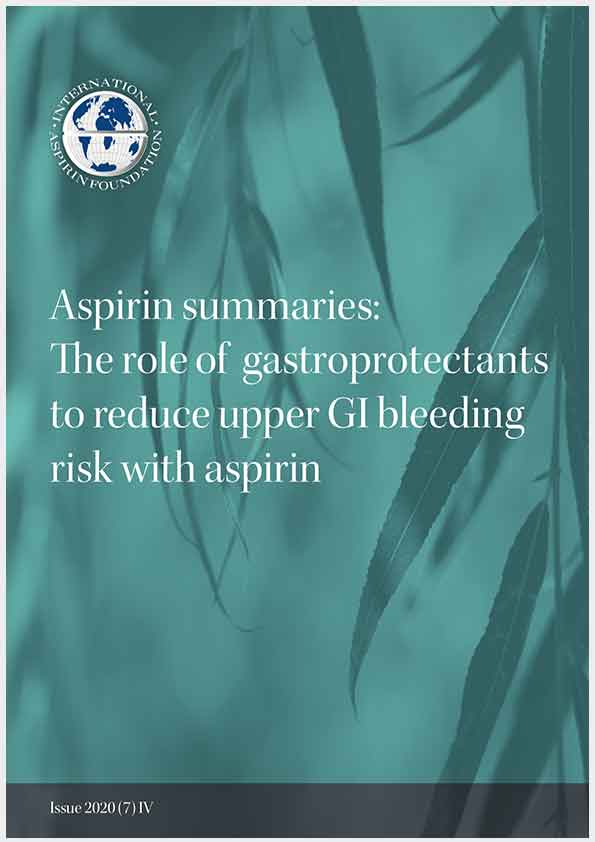The role of gastroprotectants to reduce upper GI bleeding risk with aspirin
MAGIC [Management of Aspirin- induced Gastrointestinal Complications] study – 1 year follow up
This Japanese prospective, multicentre, registry study aimed to clarify cardiovascular and bleeding events in 1506 Japanese aspirin users (75-325 mg daily for at least a year) with prior cardiovascular disease (CVD). Only major bleeding events requiring hospitalisation, or a blood transfusion were used in the study.
The patient’s prior CVD events were divided into IS/TIA = 540, CAD=632 and AF/VTE = 232 with 101 patients in 2 or more categories. Overall 61 patients (3.82%/year; 95% CI 2.97-4.91%/year) had a CV event and 15 (0.93%/ year; 95% CI 0.57-1.54%/year) had a bleeding event. The annual rates of CV and bleeding events were as follows for the different groups:
IS/TIA – CVD events = 2.81% Bleeding events=0.93% CAD – CVD events =5.32% Bleeding events = 0.75% AF/VTE – CVD events = 1.15% Bleeding events = 1.15% Those with two or more disease categories – CVD events
= 6.44% Bleeding events = 0.91%
The AF patients recruited into MAGIC were either unsuitable or unwilling to take warfarin or at low risk of having a stroke. The MAGIC study found that people taking PPIs had a lower risk of GI problems such as ulcer or erosion.
The authors conclude:
“The Management of Aspirin-induced
Gastrointestinal Complications (MAGIC) study clarified the rates of major CV and bleeding events with long-term use of aspirin in patients with prior CV diseases in real-world clinical practice. The risk-benefit balance of aspirin was acceptable in patients with IS/TIA, CAD, and multiple CV diseases but not in those with AF/VTE.”
IS=ischemic stroke, TIA = transient ischemic attack, CAD= coronary artery disease, AF = Atrial Fibrillation, VTE= venous thromboembolism
For further information please see:
Uchiyama S, Goto S, Origasa H et al. Major cardiovascular and bleeding events with long-term use of aspirin in patients with prior cardiovascular disease: 1- year follow-up results from the Management of Aspirin-induced Gastrointestinal Complications (MAGIC) study. Heart and Vessels (2020) 35:170-176.
Chemoprevention in Barrett’s oesophagus with high-dose PPI and aspirin.
Oesophageal adenocarcinoma can be hard to detect early in the disease due to a lack of symptoms and if it is diagnosed at a later stage a cure is often not possible. Barrett’s oesophagus is a condition where acid reflux from the stomach permanently changes the cells lining the oesophagus which then increases the risk of developing oesophageal adenocarcinoma. Finding a preventative treatment is therefore important. In this review article the authors describe the AspECT trial in which the combination of aspirin and high dose proton- pump inhibitor was found to be safe and effective in improving survival for people with Barrett’s oesophagus if taken for 9 years or more.
AspECT a randomised, phase III, open-label, factorial trial carried out in 84 centres in the UK and one in Canada investigated the effect of a very high and standard dose of the proton pump inhibitor (PPI) esomeprazole (40mg twice daily or 20mg once daily) taken with or without aspirin (300mg daily in the UK and 325 mg daily in Canada) for a 10 year period in people over 18 who had histologically proven Barrett’s oesophagus. Time to all-cause mortality, oesophageal adenocarcinoma or high-grade dysplasia were the primary endpoints of the study.
Women have a lower risk of oesophageal adenocarcinoma and out of the 2535 people in the intent to treat analysis only around 500 were female. As noticed in other chemoprevention studies including aspirin it takes time for an effect to be seen. None of the treatments had an effect at 5 years. After a median follow-up of 8.9 years a total of 313 composite endpoints were reported
The results showed that high dose PPI was superior to standard dose PPI in reducing events with 139 events in 1270 people in the high dose arm of the study compared with 174 events in 1265 people in the standard dose arm (TR=1.27, 95% CI 1.01to1.58; p=0.04). Although aspirin use was not shown initially to be better than no aspirin (TR=1.24, 95% CI 0.98 to1.57; p=0.07) if confounding data for patients using NSAIDs were excluded aspirin use was then statistically better than not using aspirin (TR=1.29, 95% CI 1.01 to 1.66; p=0.04; n=2236).
The study authors estimate that to prevent one event a total of 34 patients (95% CI 18 to 133) would need to take high dose PPI and 43 patients (95% CI 20-250) aspirin for 8.9 years.
Out of 1132 serious adverse events in 718 of the participants, 65 in 61 of the participants were thought to be related to the medication. There were 64 episodes of haemorrhage in 59 people with more in those taking aspirin (38 vs 21) but of these less than 1 % (20 patients) experienced a grade 3-5 bleed.
This study provided evidence that high dose PPI and aspirin taken in combination for at least 9 years, have an additive effect and that both drugs are well tolerated thus providing a safe and effective treatment to help improve survival in people with Barrett’s oesophagus.
For further information please see:
Kuku M and Khong T high-dose PPI and aspirin as chemoprevention in Barrett’s oesophagus. Drugs and therapeutics bulletin March (2020) 58 3 39-40.
Original study publication:
Jankowski JAZ, de Caestecker J, Love SB et al. Esomeprazole and aspirin in Barrett’s oesophagus (aspect): a randomised factorial trial. Lancet 2018:392:400-8
Gastrointestinal bleeding risk in low dose aspirin users after Helicobacter pylori (H. pylori) eradication
Eradication of Helicobacter pylori (H. pylori) infection is known to reduce the risk of gastrointestinal bleeding in people taking low-dose aspirin. The use of gastroprotectants such as proton pump inhibitors (PPIs) and histamine type 2 receptor antagonists (H2RA) can help reduce the risk of upper gastrointestinal bleeding but the risk of lower gastrointestinal bleeding remains.
This study aimed to increase our understanding of gastrointestinal bleeding risk in new or long-term aspirin users following treatment to eradicate H. pylori. The study looked at data from 6985 new aspirin users who started aspirin after H. pylori eradication, 5545 long term aspirin users who had started aspirin before their H. pylori eradication and continued it again after and 48 908 people not taking aspirin. All of the study participants were given clarithromycin-based triple therapy between 2003 and 2012 to eradicate H.pylori infection. More than 74% of the people in the study were taking gastroprotectants.
In new aspirin users the age-adjusted and sex-adjusted incidence of hospitalisation for gastrointestinal bleeding was 10.4 per 1000 patient years, it was 7.2 per 1000 patient years for the long-term aspirin users and 4.6 per 1000 patient years for those not taking aspirin.
The study found that new aspirin users had a higher risk of gastrointestinal bleeding when compared with those who had been on aspirin long-term and that this increased risk was observed for the first six months only for all gastrointestinal bleeding as a group, for
upper gastrointestinal bleeding but not for lower gastrointestinal bleeding. Lower gastrointestinal bleeding therefore appears to be the most important source of bleeding in people who are taking aspirin long term and who have had H.pylori eradicated.
The study confirmed that a history of gastrointestinal bleeding and peptic ulcer are risk factors for further gastrointestinal bleeding events even after H.pylori eradication for both new and long term aspirin takers. A subgroup analysis from the study shows that gastroprotective agents reduced the risk of aspirin related gastrointestinal bleeding in those 60 years or older and those who are concurrently using NSAIDs or other antiplatelet therapies. The authors of this study recommend considering gastroprotection prophylactically especially during the initial (6 months) of aspirin use.
The authors conclude:
“Although treatment with gastroprotective agents appears to reduce the risk of GIB (gastrointestinal bleeding) after H.pylori treatment, the risks of LGIB (lower gastrointestinal bleeding) between new and chronic aspirin users continued and showed no trend of decline.”
For further information please see:
Guo CG, Cheung KS and Zhang F et al. Incidences, temporal trends and risks of hospitalisation for gastrointestinal bleeding in new or chronic low-dose aspirin users after treatment for Helicobacter pylori: a territory-wide cohort study. Gut (2020) 69: 445-452.
Guideline adherence and effects of aspirin in management and outcomes in lower gastrointestinal bleeding
This abstract looks at aspirin use in people who are at risk of cardiovascular or neurological events and gastrointestinal bleeding. Aspirin has a long effective half-life and because of this its use prior to admission to hospital continues to affect haemostasis for the first week in hospital. This study aimed to look at the impact of aspirin use for patients admitted to a large academic hospital with lower gastrointestinal bleeding.
The investigators performed a retrospective chart review of all the patients (208) admitted between January 2010 and August 2018 with confirmed lower gastrointestinal bleeding and compared patients on aspirin therapy (100 patients) with those that were not taking aspirin (108 patients). They found there was no difference in ICU stays for the aspirin versus the non- aspirin groups (41% vs 32%, p=0.20), re-bleeding during hospitalization (16% vs 16%, p= 0.96), blood transfusions given (55%vs 50%,p=0.47), or any other therapeutic intervention (19%vs 26%,p=0.233). Those on aspirin were found to be older (mean age 76.8 vs 65.4 years; p<.001) with a higher Charlson Comorbidity Index (CCI) (5.7 vs 4.1; p<0.001).
Of those who were taking aspirin on admission 65% continued to use aspirin at discharge. This did not correlate with ICU stay (35% vs 51%, p=0.12) or recurrent bleeding (11% vs 26%, p=0.052), but happened less where a blood transfusion had been required (48% vs 69%, p=0.045).
Even though the people who were using aspirin in this study were older, with more comorbidities, they were not more likely to need ICU stays or blood transfusions when admitted for lower gastrointestinal bleeding and there was not a greater rate of inpatient rebleeding.
The authors conclude:
“These data support that aspirin use does not affect inpatient LGIB management and could potentially be safely continued during hospitalization. Despite this, approximately 1/3 of patients had aspirin held at discharge; some of these had clear indications for ongoing use. More data is needed to clearly define the impact of aspirin on severity of LGIB and evaluate if holding it is ever appropriate”.
For further information please see:
Lipcsey M, Stein DJ, Maheshwari R et al. Guideline adherence and effects of aspirin in management and outcomes in lower gastrointestinal bleeding. Gastroenterology, May 2019 156(6) S-735. AGA Abstracts Mo1255.
Extracts from the 2019 International Aspirin Foundation Scientific Conference, Rome, 2019: benefits and risks of antithrombotic therapy for cardiovascular disease prevention
Antithrombotic therapy in secondary cardiovascular disease (CVD) prevention was one of the many topics discussed during our Scientific Conference, where international experts gathered to discuss and debate ‘Reducing upper gastrointestinal bleeding by more extensive use of gastroprotectant agents’
Below are the speaker biographies and their extract from the conference report.
- Andrew T Chan (Harvard University, Boston)
Mechanisms of upper gastrointestinal complications induced by antithrombotic drugs - Angel Lanas (University of Zaragoza)
Clinical trials of gastroprotectant agents
Professor Andrew T Chan
Andrew T. Chan, MD, MPH, Chief, Clinical and Translational Epidemiology Unit, Vice Chair, Division of Gastroenterology, Massachusetts General Hospital, Boston, Co-leader, Cancer Epidemiology Program, Dana-Farber/Harvard Cancer Center, Boston. As a clinical gastroenterologist, Dr. Chan specializes in familial gastrointestinal cancer syndromes and cancer prevention. Dr. Chan is a leading investigator in the epidemiology of colorectal cancer and other digestive diseases, with a focus on chemoprevention with aspirin and the gut microbiome.
An elected fellow of the American Society of Clinical Investigation, his work is supported by the National Cancer Institute, the National Institute of Diabetes and Digestive and Kidney Diseases, Cancer Research UK, the American Gastroenterological Association (AGA), the Damon Runyon Cancer Research Foundation, and the Crohn’s and Colitis Foundation of America. He has published over 380 papers in the field of colorectal cancer and other chronic digestive diseases in leading journals, including the New England Journal of Medicine, Journal of the American Medical Association, Lancet, Science Translational Medicine, Gastroenterology and Gut. In 2016, he was recognized with a Top Ten Clinical Research Achievement award by the Clinical Research Forum. Dr Chan is a section editor for Gastroenterology, serves on the editorial board of Cancer Prevention Research and Cancer Epidemiology Biomarkers and Prevention, and is Chair of the Gastrointestinal Oncology Section of the AGA.
Mechanisms of upper gastrointestinal complications induced by antithrombotic drugs
Prof. Andrew T Chan (Harvard University, Boston, USA) delivered a comprehensive and clear insight into the mechanism behind the upper GI complications that are induced by antithrombotic drugs. Prof. Chan described epidemiological factors influencing aspirin and adverse GI bleeding events. Most of the bleeding occurs within the first 6 months of regular aspirin use [18] and is strongly associated with higher dose rather than longer duration of treatment [19, 20]. He also explained that aspirin may be associated with a higher relative bleeding risk when used for primary rather than secondary CVD prevention but this is balanced by the lower baseline risk within those taking aspirin for primary prevention [21].
As we grow older, our risk of a serious bleed increases with regular aspirin [22]. Helicobacter pylori (H. pylori) infection also increases the risk of having a gastroduodenal ulcer and gastric bleeding in those taking regular aspirin [23]. It was also noted that H. pylori eradication can increase compliance with low-dose aspirin as gastric intolerance such as dyspepsia and reflux is reduced. Later in the conference, the prevalence rate of H. pylori was discussed; this varies from approximately 10%–20% in UK, USA and Sweden to around 70% in some Middle Eastern countries. In the case of primary prevention, there is time to screen for H. Pylori before treatment commences, whereas in secondary prevention the H. pylori test may need to carried out after the patients has started treatment. If testing is positive H. pylori can be eradicated and thus help to reduce the risk of GI side effects. Other risk factors for upper GI complications with regular aspirin or other non-steroidal anti-inflammatory drugs (NSAID) include the following.
(a) Previous peptic ulcer or GI bleed
(b) Concurrent use of two or more NSAIDs (c) Concurrent use of a corticosteroid
(d) Concurrent use of an anticoagulant
(e) Presence of severe disease [24].
It is hoped that tools to estimate the individualised risk of CVD events to be avoided versus bleeding events caused by aspirin initiation will be developed. Work has been carried out in New Zealand on the 385,191 individuals who received a CVD risk assessment between 2007 and 2016 and has shown a predicted 5-year bleeding risk of 1% in women and 1.1% in men [25].
Next, Prof. Chan explained how aspirin causes mucosal injury by inhibiting the usual gastro protective mechanisms of prostaglandins (PGs) and has additional PG-independent local actions which result in direct injury and death of epithelial cells. This occurs as a result of aspirin changing the acid balance in the gastric mucosa (mostly in the small and large bowel) damaging tight-junctions and exposing the gastric mucosa to the gut content [26, 27]. Other ways in which aspirin has a topical effect on gastric mucosa include its ability to penetrate cells and decrease the epithelial surface hydrophobicity making the cells more susceptible to injury [28]; the deacetylation of aspirin to salicylate is cytotoxic [29] and aspirin can alter the local microcirculation resulting in tissue injury [30]. In this way, the topical PG-independent mechanisms of aspirin have effects throughout the GI system (Figure 3). It has only a minor effect on the stomach/duodenum and enteric-coated aspirin does not significantly alter the risk of a gastroduodenal ulcer. The more significant topical effect of aspirin on GI tract bleeding takes place in the distal small bowel and large bowel [31, 32].
However, it is the systemic effects of aspirin that are most important for its GI side effects and these side effects are not reduced when presentations such as enteric-coated aspirin [32], or different routes of administration of NSAIDS, e.g. IM or IV are used [33, 34].
Aspirin works systemically to inhibit PG synthesis and platelet activation which is why it can also cause bleeding adverse events. Aspirin and NSAIDS as a group block the cyclo-oxygenase (COX) enzymes that are responsible for PG synthesis thus impacting on the body’s gastro protective mechanisms. Platelet activation is also vital for clot formation and the production of growth factors that help tissue to heal.
Other non-aspirin, anti-platelet drugs such as the P2Y12 inhibitor agents or thienopyridines (clopidogrel, ticagrelor and prasugrel) also cause GI bleeding due to reduced growth factor production and increased risk of bleeding due to an impaired clotting mechanism [34]. Some people with a genetic variation are carriers of the CYP2C19*17 allele and have excessive platelet inhibition when taking thienopyridines. These individuals are more likely to develop bleeding complications with thienopyridines therapy [35, 36]. Other factors that influence the bleeding risk with P2Y12 receptor antagonists include: diabetes, age, smoking, weight and drug interactions [37, 38]. In contrast to aspirin P2Y12 receptor, antagonists are probably not the main cause of peptic ulcer by themselves but they potentiate them by their anti-platelet activity and altered angiogenesis [34].
The protease-activated receptor–1 (PAR-1) antagonist, vorapaxar which is effective for the secondary prevention of CVD in patients with impaired renal function when added to aspirin or another anti-platelet agent significantly increases the risk of major bleeding [39, 40].
Therefore, aspirin increases the risk of GI bleeding by both topical and systemic mechanisms and the newer anti- platelet agents carry a similar or slightly higher bleeding risk. Combination antiplatelet regimens increase the risk of having a bleed further with aspirin plus clopidogrel having a higher bleeding risk than aspirin alone and triple/ quadruple regimens further exacerbating the overall bleeding risk. Adding a proton pump inhibitor (PPI) and/or a histamine 2 receptor antagonist (H2RA) can reduce the risk of upper GI bleeding [32, 22].
Concerns that PPIs may block some of the antithrombotic effect of clopidogrel appear to not be clinically important but are still of enough concern for the FDA to warn people to consult their clinician before staring a PPI if they are prescribed clopidogrel. The number needed to treat with a PPI in order to avoid a disabling bleed is over 300 in younger populations but this figure drops to around 25 in older adults. It is important to carefully consider the likely risk versus benefit of each antiplatelet and how many antiplatelets are required when selecting a treatment regimen for patients [41]. Platelet function tests may help to facilitate the choice of antiplatelet therapy [42, 43]. De-escalation of combination antiplatelet regimens will be also considered important [44].
Professor Angel Lanas
Angel Lanas is Professor of Medicine of the University of Zaragoza, Vice-Dean for Research Affairs at the Medical School of Medicine University of Zaragoza, Chairman of the Digestive Diseases Service at the University Hospital “Lozano Blesa” of Zaragoza. Spain and Scientific Director of the Aragón Health Research Institute.
Dr. Lanas was visiting professor to the Department of Gastroenterology at the University of Alabama in Birmingham, Alabama, USA since November 1989 to Dicember1991, where he worked with Professor Basil Hirschowitz.
He is or has been member of the Advisory Board of several high-impact factor Journals of the specialty, International Associate Editor of The American Journal of Gastroenterology and Editor of Frontiers in Medicine-Gastroenterology. He has also been invited as Visiting Professor to different American, Asian and European Universities. Over the years, he has held leadership positions and received numerous awards for his contributions Among other associations he is member and International Fellow of the American Gastroenterological Association, member of the General Assembly of the United European Gastroenterology Federation and the Spanish Association of Gastroenterology (AEG). He was president of the AEG for 4 years and President of the AEG Foundation for another 4 years.
Dr. Lanas is actively involved in both clinical and basic investigation relating to acid peptic disorders, particularly NSAIDs, aspirin and gastrointestinal toxicity, as well as mechanisms of chemoprevention of colon cancer and Barrett’s esophagus. Professor Lanas has published numerous articles pertaining to gastrointestinal damage, NSAIDs and inflammation in the most prestigious Medical Journals including the New England Journal of Medicine, The Lancet, Gastroenterology, Gut, The American Journal of Gastroenterology and American Journal of Medicine among others.
Clinical trials of gastroprotectant agents
Prof. Angel Lanas (University of Zaragoza, Spain) in a complementary clinical talk presented data from clinical trials of gastroprotectant agents used with antithrombotic therapy. Despite being the cornerstone for the prevention of CVD, antiplatelet and anticoagulant drugs are associated with a two- and fourfold increased risk of GI bleeding, respectively. The newer DOACs also increase the risk of gastric bleeding [45] the risk increases when antithrombotic therapies are combined and when the patient has other risk factors for a bleeding event. Low-dose aspirin (75–100 mg daily) is the most widely prescribed antiplatelet drug and endoscopic trials have shown that PPIs are effective in treating and preventing gastroduodenal ulcers associated with its use. The H2RA famotidine is also effective at reducing gastric bleeds with aspirin but there is less consistent data to support its use, and studies indicate that PPIs have superior efficacy [46].
Several studies have shown that PPI co-therapy with either 20 or 40 mg of esomeprazole reduce by 71%–85% the occurrence of peptic ulcers associated with low-dose aspirin use (Figure 4) [47, 48].
To put the risk into context, Prof. Lanas explained that based on a meta-analysis of RCTs published by the Antithrombotic Trialists’ (ATT) collaboration [12] and on estimations based on epidemiological studies, in primary prevention, aspirin use was associated with three extra GI bleeds for each 10,000 patient-years and 19 extra cases per 10,000 patient-years in secondary prevention (Figure 5)
The ATT [12] meta-analysis of RCTs interestingly showed that it is the well-known CVD risk factors such as age, male gender, diabetes, smoking, increased blood pressure (BP) or obesity that are also risk factors for GI bleeding (Figure 6). In high-risk patients with a previous ulcer, PPIs are effective in reducing a recurrence. Omeprazole (PPI) has been shown to be effective in preventing upper GI complications for patients on dual anti-platelet therapy. The benefit of using antisecretory drugs such as a PPI or H2RA to prevent GI bleeding when anticoagulants are used alone or in combination with antiplatelets is as yet unproven.
However, antisecretory agents have no effect on GI damage prevention associated with antithrombotic agents in the small bowel. Further investigation is needed with ‘mucosal protectant’ or other agents. Other future areas of research interest include the gut microbiome and studies already under way to increase understanding around how the gut microbiome affects bleeding risk, and if there is a role for treatment here such as probiotics. This will be, especially, useful if ways to protect the small bowel from bleeding risk can be developed.
Misoprostol exhibits moderate efficacy in healing small bowel ulcers associated with a previous bleeding event. Further research is needed.
Prof. Lanas concluded that preventing gastric bleeding with antithrombotic regimes is an important area of unmet clinical need and will grow in importance with the current increasingly elderly population needing these agents. PPIs have been shown to be effective at preventing peptic ulcers and peptic ulcer bleeding in patients taking low-dose aspirin. PPIs are better than famotidine (H2RA) in this effect












